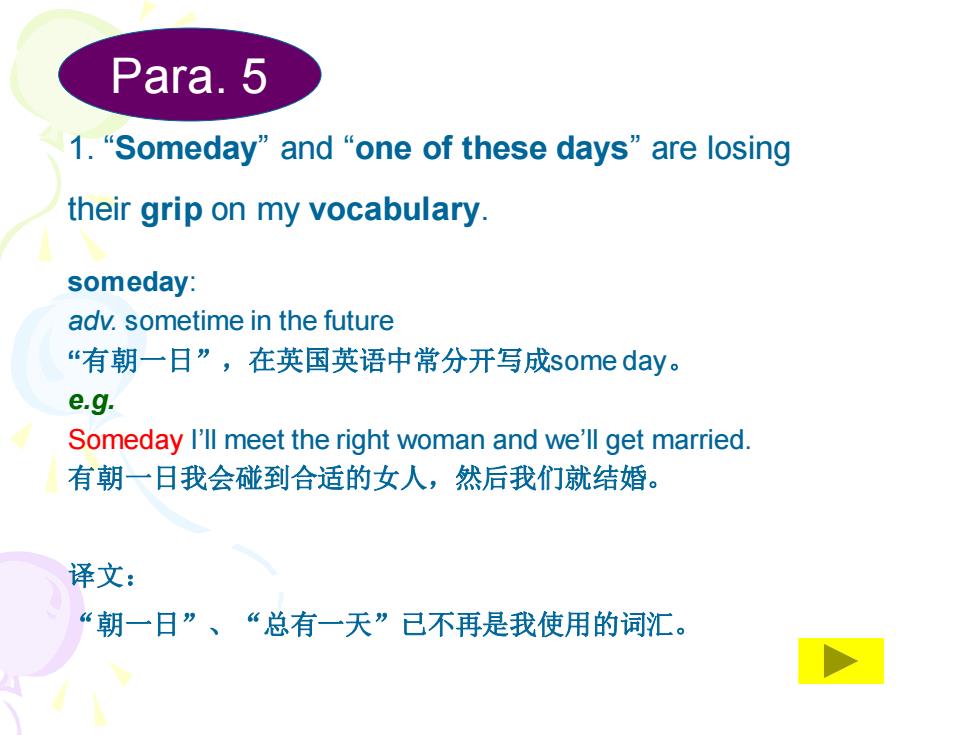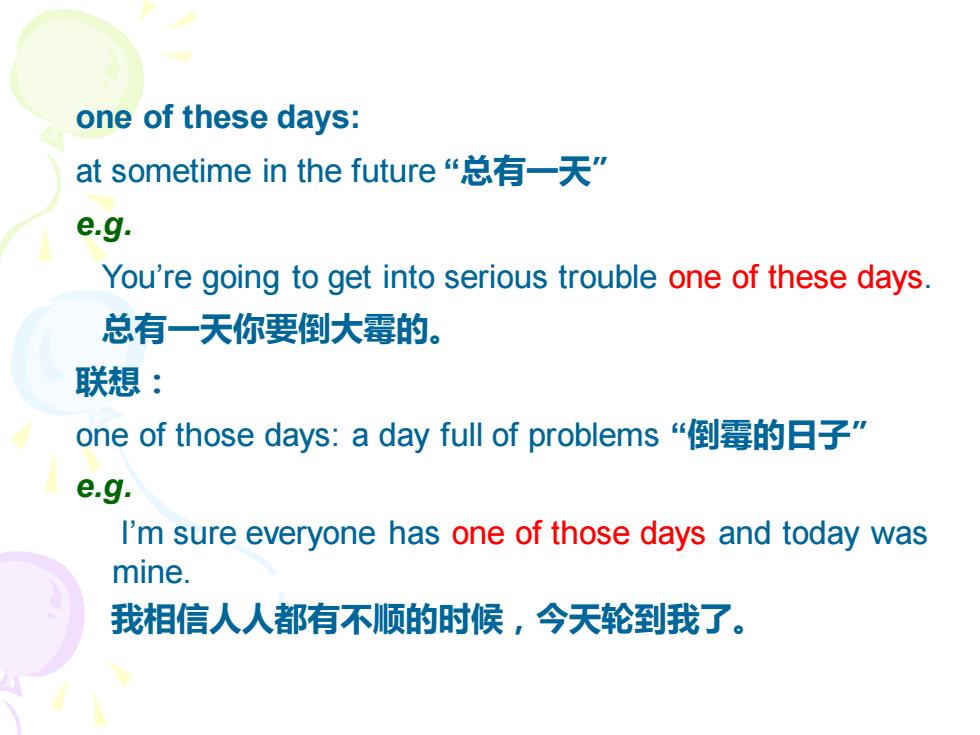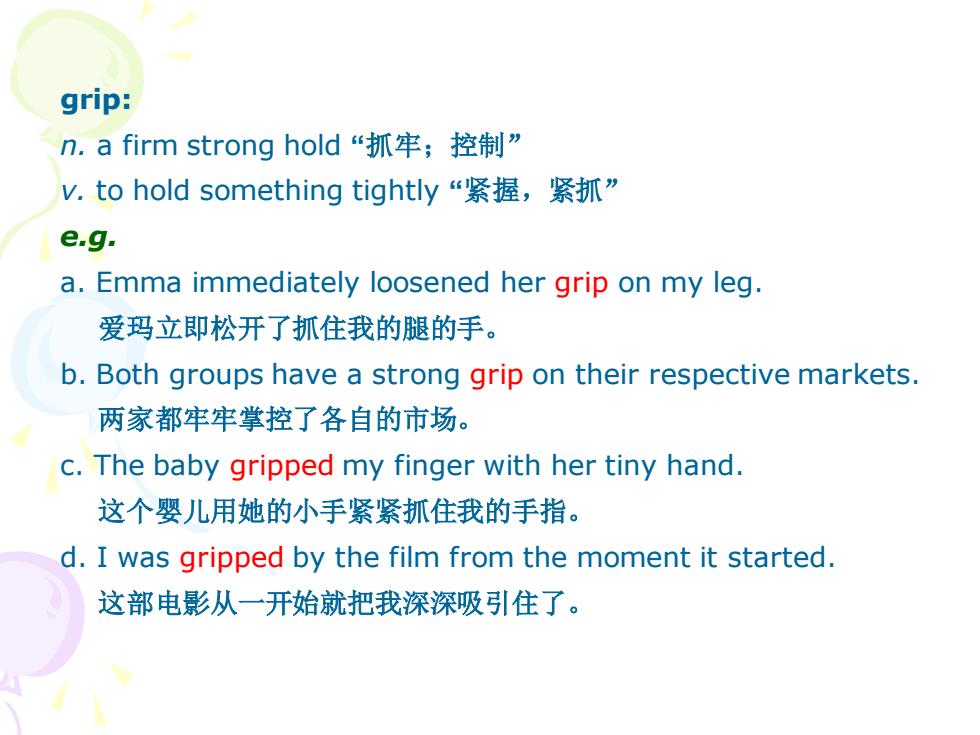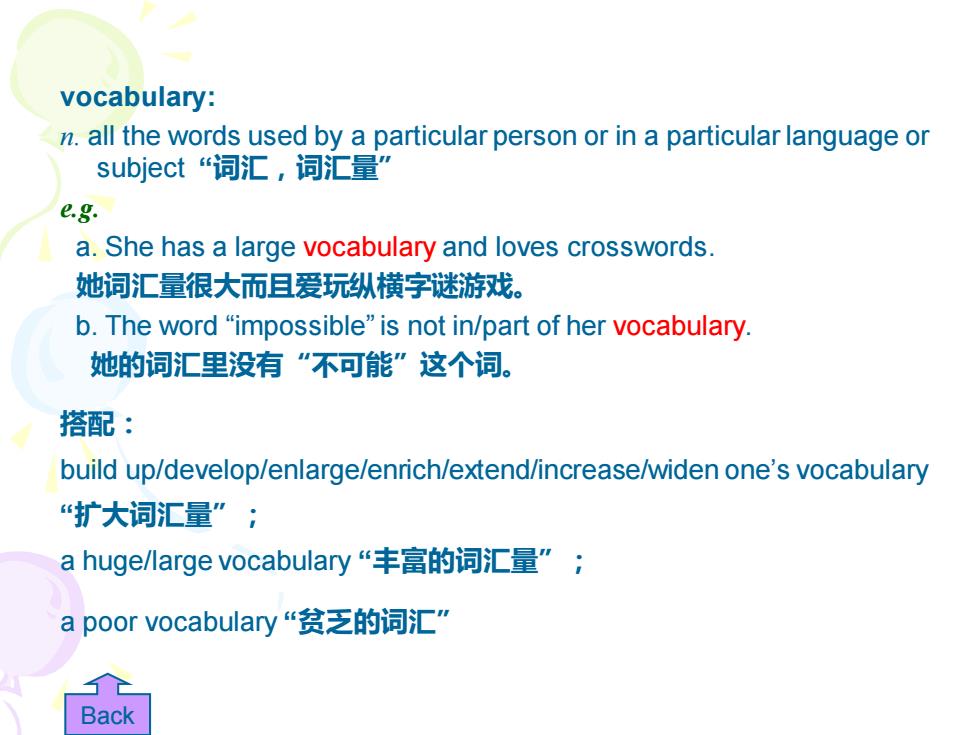
Para.5 1.“Someday"and“one of these days”are losing their grip on my vocabulary. someday: adv.sometime in the future “有朝一日”,在英国英语中常分开写成some day。 e.g. Someday I'll meet the right woman and we'll get married. 有朝一日我会碰到合适的女人,然后我们就结婚。 译文: “朝一日”、“总有一天”已不再是我使用的词汇
1. “Someday” and “one of these days” are losing their grip on my vocabulary. Para. 5 someday: adv. sometime in the future “有朝一日”,在英国英语中常分开写成some day。 e.g. Someday I’ll meet the right woman and we’ll get married. 有朝一日我会碰到合适的女人,然后我们就结婚。 译文: “朝一日”、“总有一天”已不再是我使用的词汇

one of these days: at sometime in the future“总有一天' e.g. You're going to get into serious trouble one of these days. 总有一天你要倒大霉的。 联想: one of those days:a day full of problems“倒霉的日子” e.g. I'm sure everyone has one of those days and today was mine. 我相信人人都有不顺的时候,今天轮到我了
one of these days: at sometime in the future “总有一天” e.g. You’re going to get into serious trouble one of these days. 总有一天你要倒大霉的。 联想: one of those days: a day full of problems “倒霉的日子” e.g. I’m sure everyone has one of those days and today was mine. 我相信人人都有不顺的时候,今天轮到我了

grip: n.a firm strong hold“抓牢;控制” v.to hold something tightly“紧握,紧抓” e.g. a.Emma immediately loosened her grip on my leg. 爱玛立即松开了抓住我的腿的手。 b.Both groups have a strong grip on their respective markets. 两家都牢牢掌控了各自的市场。 c.The baby gripped my finger with her tiny hand. 这个婴儿用她的小手紧紧抓住我的手指。 d.I was gripped by the film from the moment it started. 这部电影从一开始就把我深深吸引住了
grip: n. a firm strong hold “抓牢;控制” v. to hold something tightly “紧握,紧抓” e.g. a. Emma immediately loosened her grip on my leg. 爱玛立即松开了抓住我的腿的手。 b. Both groups have a strong grip on their respective markets. 两家都牢牢掌控了各自的市场。 c. The baby gripped my finger with her tiny hand. 这个婴儿用她的小手紧紧抓住我的手指。 d. I was gripped by the film from the moment it started. 这部电影从一开始就把我深深吸引住了

vocabulary: n.all the words used by a particular person or in a particular language or subject“词汇,词汇量” e.g. a.She has a large vocabulary and loves crosswords. 她词汇量很大而且爱玩纵横字谜游戏。 b.The word "impossible"is not in/part of her vocabulary. 她的词汇里没有“不可能”这个词。 搭配: build up/develop/enlarge/enrich/extend/increase/widen one's vocabulary “扩大词汇量”; a huge/large vocabulary“丰富的词汇量”; a poor vocabulary“贫乏的词汇” Back
vocabulary: n. all the words used by a particular person or in a particular language or subject “词汇,词汇量” e.g. a. She has a large vocabulary and loves crosswords. 她词汇量很大而且爱玩纵横字谜游戏。 b. The word “impossible” is not in/part of her vocabulary. 她的词汇里没有“不可能”这个词。 搭配: build up/develop/enlarge/enrich/extend/increase/widen one’s vocabulary “扩大词汇量”; a huge/large vocabulary “丰富的词汇量”; a poor vocabulary “贫乏的词汇” Back

Para.5 2.If it's worth seeing or hearing or doing,I want to see and hear and do it now. 句中t指代值得看、听或做的事。 译文: 如果某件事值得看,听或做,我就会立即付诸行动
2. If it’s worth seeing or hearing or doing, I want to see and hear and do it now. 句中it指代值得看、听或做的事。 Para. 5 译文: 如果某件事值得看,听或做,我就会立即付诸行动